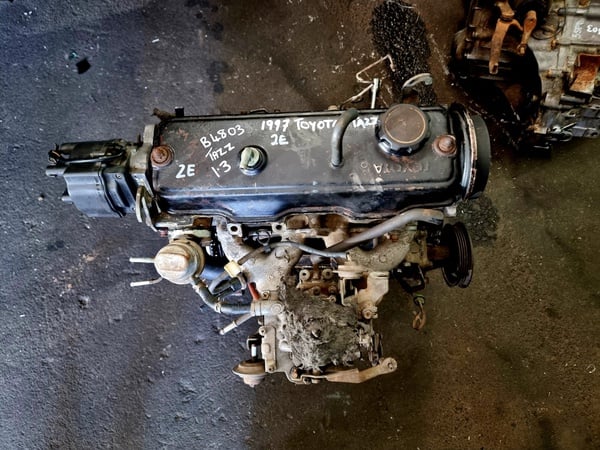Engine Buying Specialist Tips on Choosing the Right Engine for Your Specific Requirements
Selecting the appropriate engine for your details demands involves a complicated interaction of variables that go beyond plain horsepower numbers. By diving right into the intricacies of power versus performance, examining gas rankings, and budgeting for long-term prices, one can truly optimize their engine option.
Power Vs. Effectiveness: Locating the Equilibrium

When choosing an engine, it is critical to strike an equilibrium in between power and performance to fulfill your specific requirements properly. Power refers to the engine's capability to generate power for propulsion, determining factors like acceleration, pulling capacity, and general performance (Toyota Tazz Engine For Sale). On the other hand, efficiency connects to exactly how well the engine utilizes gas to create power, affecting elements such as gas economic climate and ecological friendliness
Attaining the ideal equilibrium in between power and efficiency is crucial since an engine that is too effective may eat extreme gas, resulting in greater operating expense and unneeded strain on the atmosphere. Conversely, an engine that focuses on efficiency over power may cause sluggish efficiency, especially sought after circumstances like pulling heavy loads or driving uphill.
To make an educated choice, take into consideration variables such as your regular driving problems, the designated use the car, and your individual preferences. By evaluating your demands and concerns, you can pick an engine that strikes the best balance between power and effectiveness, making sure optimum efficiency while minimizing ecological influence and operating expenses.
Understanding Engine Size and Type
Furthermore, engine type plays an essential function in establishing the efficiency features of an engine. Usual engine kinds include inline engines, V engines, and rotary engines, each with its distinct advantages and drawbacks. The engine type influences variables such as the engine's dimension, weight circulation, and power shipment. Understanding the interplay in between engine dimension and type is essential in choosing an engine that lines up with your specific needs and top priorities, whether it be power, performance, or an equilibrium of both.
Consider Your Automobile's Demands
Considering your lorry's demands is a fundamental action in the engine choice process to make certain optimal efficiency and performance. It advice is vital to evaluate factors such as the meant use the car, its weight, hauling ability, and fuel performance requirements. If you are looking for an engine for a heavy-duty vehicle that will be made use of for towing, you will need an effective engine with high torque capabilities. On the other hand, if you are picking an engine for a compact cars and truck mainly used for city commuting, gas performance might be a more important variable to consider.

Evaluating Gas Efficiency Ratings
Assessing gas effectiveness ratings is an essential aspect of picking the appropriate engine for your lorry, ensuring price financial savings and ecological sustainability. Fuel efficiency ratings, commonly measured in miles per gallon (MPG) for gasoline engines or kilowatt-hours per 100 miles he said (kWh/100 miles) for electric engines, show just how far a car can travel on a details amount of fuel or electrical energy. Greater MPG or lower kWh/100 miles worths signify extra effective engines, converting to lowered gas expenses and lower carbon exhausts.
Additionally, compare various engine alternatives within the exact same car course to recognize the most affordable choice. Elements such as engine dimension, weight, the rules of aerodynamics, and crossbreed or electrical abilities can all affect gas efficiency.
Budgeting for Long-Term Prices
Purposefully preparing for long-term expenses is essential when choosing an engine, ensuring economic sustainability over the car's life-span. While the preliminary acquisition price of an engine is a considerable variable, it is essential to consider the lasting prices linked with upkeep, repairs, and gas consumption.
Furthermore, researching the schedule and price of replacement components for the chosen engine is essential in spending plan planning. By carefully budgeting for these long-lasting costs and factoring them right into the decision-making procedure, people can pick an engine that not only fulfills their instant demands yet also continues to be affordable throughout its life expectancy.
Conclusion
In verdict, choosing the right engine for your details needs requires balancing power and effectiveness, recognizing engine dimension and kind, considering your lorry's requirements, examining gas efficiency ratings, and budgeting for long-lasting expenses. By meticulously considering these elements, you can make sure that you pick an engine that fulfills your needs and provides optimal performance for your vehicle.
To even more fine-tune the choice procedure of an engine that strikes the ideal balance between power and efficiency, it is vital to dig into the ins and outs of comprehending engine dimension and type. Engine size refers to the complete quantity of air and gas that can be pressed via the engine cyndrical tubes. Usual engine kinds include inline engines, V you could try here engines, and rotary engines, each with its distinct advantages and downsides. Recognizing the interplay between engine dimension and kind is crucial in choosing an engine that lines up with your particular requirements and priorities, whether it be power, effectiveness, or a balance of both.
Fuel performance rankings, commonly determined in miles per gallon (MPG) for gas engines or kilowatt-hours per 100 miles (kWh/100 miles) for electric engines, show just how far a car can travel on a specific quantity of fuel or electrical power.